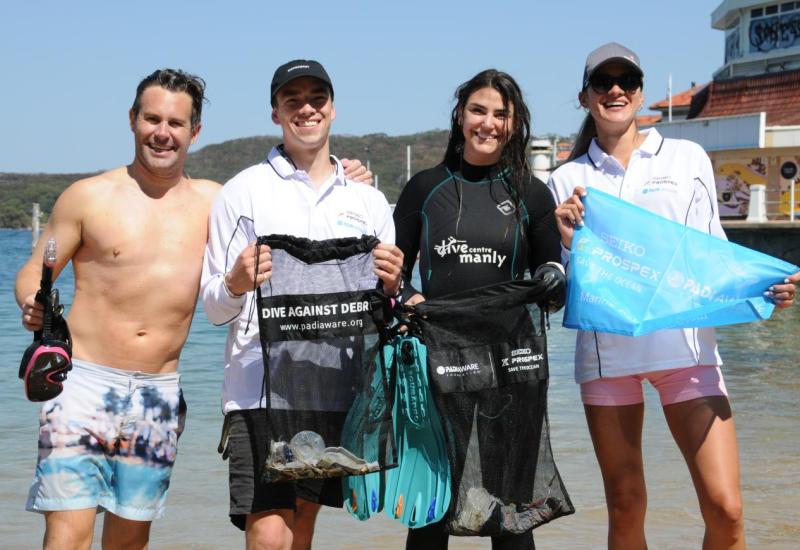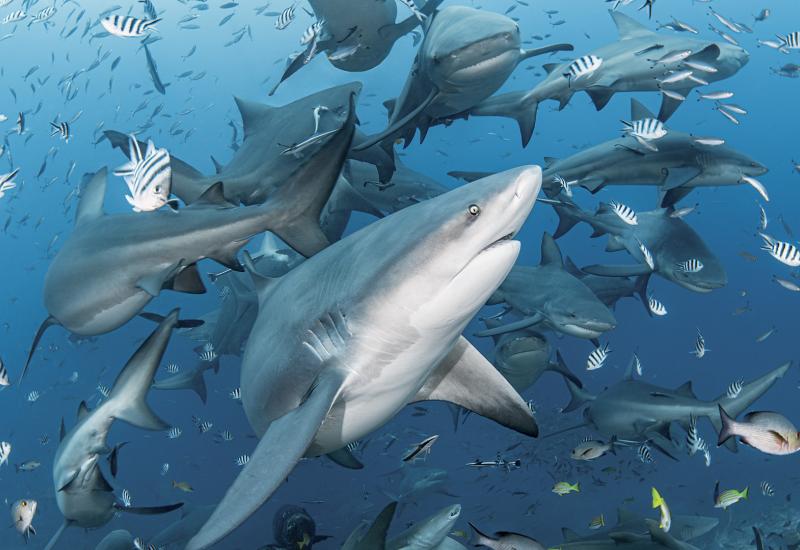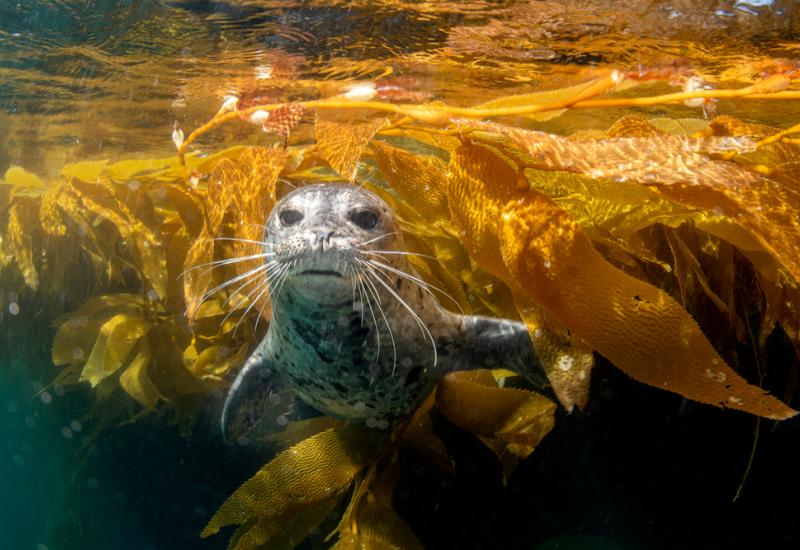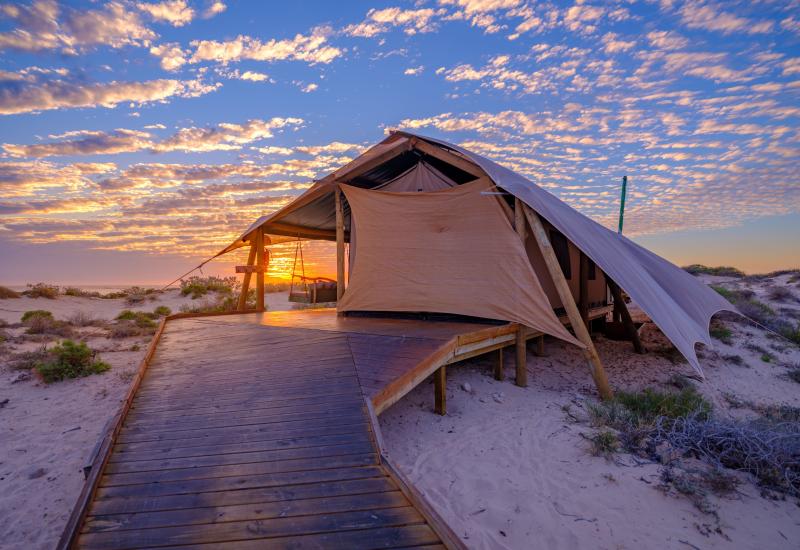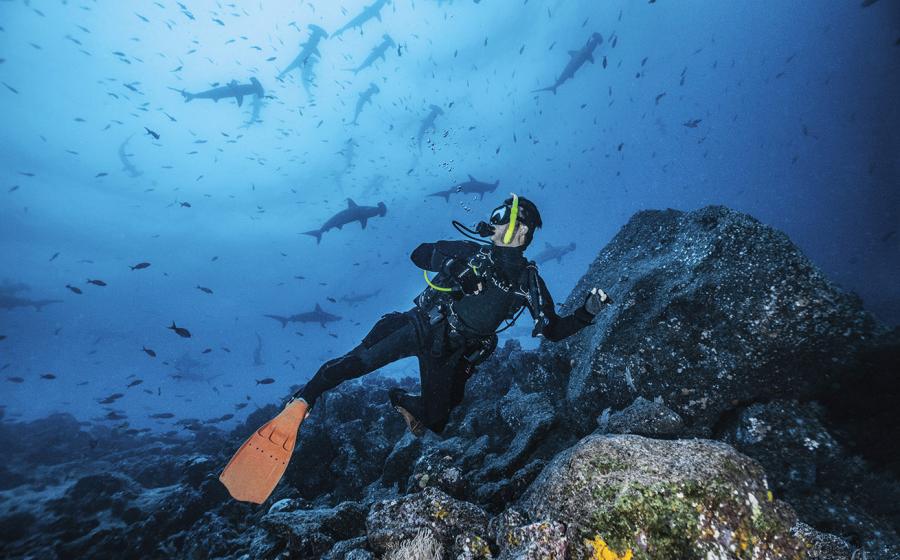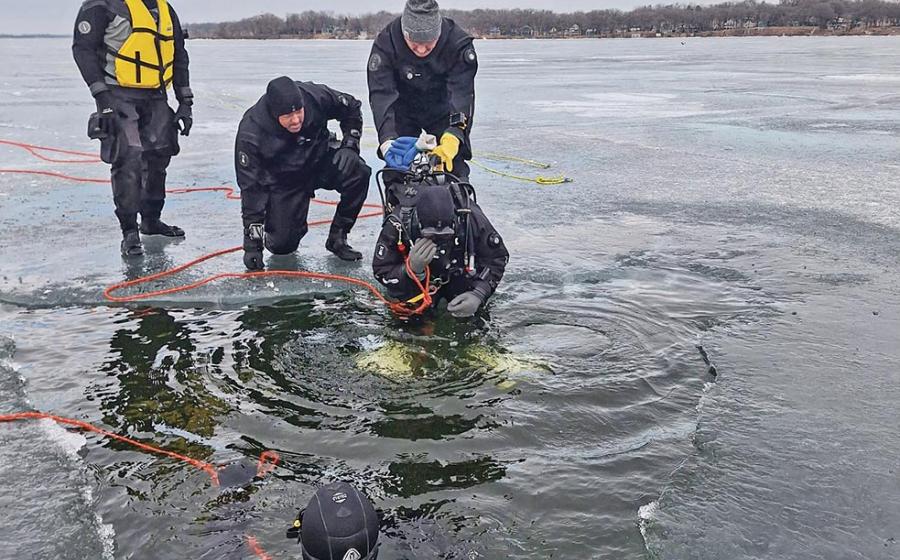The Best Destinations for New Scuba Divers
Small diver-to-instructor ratios, standards for safe diving practices, shallow reefs and choice conditions make these destinations popular with our readers.

Antonio BusielloA diver fins past a giant barrel sponge at Half Moon Bay Wall in Roatan, Honduras.
1. BAY ISLANDS, HONDURAS
“It starts with our staff,” says Elizabeth Midkiff, owner of CoCo View Resort on the island of Roatan, Honduras. “Our divemasters are attentive and really help a new diver feel comfortable in the water.”
The same is true for many dive resorts on this scuba- centric island, making it one of the top choices for the just-certified set. CoCo View also stands out for its shore diving. From the dining and hang- out area, it’s steps to the water, where divers have cleared a path through the sea grasses, leading to a floating platform—in other words, it’s obvious where the best diving is. Shore diving also allows divers to take their time, set- ting their own pace for the day and for the trip.
“You can slowly go deeper and deeper as you feel comfortable with your equipment and buoyancy—there is no rushing here,” Midkiff says.
READERS PICKS
Resorts
• Anthony’s Key Resort, Roatan, Bay Islands
• CoCo View Resort, Roatan, Bay Islands
Operators
• Anthony’s Key Resort, Roatan, Bay Islands
• Dockside Dive Center at CoCo View Resort, Roatan, Bay Islands
Liveaboards
• Roatan Aggressor, Bay Islands
2. AUSTRALIA
The 900 islands and cays of the Great Barrier Reef seem to do the impossible: deliver daily en- counters with megafauna, all within reach of the open-water diver. This destination stays atop divers’ bucket lists thanks to sites such as Cod Hole, where visitors are greeted mask to gaping jaw with 6-foot potato cod. Elsewhere in the Ribbon Reefs, the best destination for newbies, are dives with dozens of gray reef sharks—all on the itinerary for liveaboards based there, such as award- winner Spirit of Freedom.
READERS PICKS
Liveaboards
Spirit of Freedom, Australia
3. HAWAII
Safety comes first in the Hawaiian islands. “Kona has high safety standards, being in the U.S.,” says Byron Kay, owner and operator of Kona Honu Divers on Hawaii Island. Kona Honu Divers allows a maximum of four students per instructor. For the Discover Scuba Diving program, it allows only two participants per instructor.
And in Hawaii, most dives are guided—which means that underwater, there is al- ways a professional present to keep an eye on the group. “Diving without a guide just isn’t a thing here,” Kay says.
These islands are also great for beginners because they offer a variety of features—including arches, swim-throughs and some shallow wrecks—allowing newcomers to try different experiences without leaving their comfort zone.
READERS PICKS
Operators
• Jack’s Diving Locker, Big Island, Hawaii
• Kona Honu Divers, Big Island, Hawaii Scuba Shack, Maui, Hawaii
• Big Island Divers, Hawaii
• Kona Diving Company, Big Island, Hawaii
Liveaboards
• Kona Aggressor II, Hawaii
See Complete Results from the 2020 Readers Choice Awards

Brandon ColeSouthern stingrays hover over a sandy bottom in Grand Cayman.
4. CAYMAN ISLANDS
On Grand Cayman, you can’t drive far without running into a dive center—great news if you’re new to the sport.
“Our shore dives usually have a dive shop at them, so you can get a proper briefing before you go in—and you can choose to go in with or without a guide,” says Emma-Jane Fisher, part of the Sunset House dive operation. “A lot of places have shore diving, but you’re just reading out of a guidebook to know what to expect.” Grand Cayman isn’t limited to just shore diving, Fisher says. The island has boat options too.
Plus, the list of specialty courses available and well- suited to the topography of Grand Cayman is long, and includes Peak Performance Buoyancy, Navigation, Night Diver and more.
Fisher adds: “We have lots of little baby steps you can take before getting into advanced diving. Plus, most of them you can do from shore— without being limited to a schedule or boat availability.”
READERS PICKS
Resorts
• Little Cayman Beach Resort
• Sunset House, Grand Cayman
• Brac Reef Beach Resort, Cayman Brac
Operators
• Ocean Frontiers, Grand Cayman Reef Divers, Little Cayman
Liveaboards
• Cayman Aggressor IV (replaced by Cayman Aggressor V)
5. INDONESIA
The archipelago nation of Indonesia is a buffet of options, thousands of square miles of possibility. Smack in the Coral Triangle, it’s home to the type of reefs every diver drools over: pristine, colorful and diverse, with 400-plus coral species.
The sheer brilliance and biodiversity of this world-class diving hub will have new divers hooked for life, and the large nation offers a variety of experiences. There are locations where the current picks up and sites dip beyond 60 feet, so new divers should select operators who will give them the proper attention.
Liveaboards such as Readers Choice winners Pelagian and Arenui are mindful of this. Arenui has five divemasters on board for 16 guests, so groups of two to four have their own guides. Brand-new divers are sometimes treated to one-on-one service.
After all, many divers fly across oceans to visit Indonesia, and award-winning operators want to make sure that you enjoy yourself so much that you can’t help but come back for seconds.
READERS PICKS
Resorts
• Wakatobi Dive Resort, Southeast Sulawesi, Indonesia
• Misool Eco Resort, Raja Ampat, Indonesia
Operators
• Wakatobi Dive Resort Dive Center, Southeast Sulawesi, Indonesia
Liveaboards
• The Arenui, Indonesia
• Pelagian, Wakatobi, Indonesia
6. BONAIRE
Bonaire’s location outside the hurricane belt contributes to reliable conditions suited to all levels of diving.
Bonaire is known as the world’s shore-diving capital. The main island’s 60-plus official sites are marked, allowing any certified diver to go explore its nearshore reefs with a buddy.
But the Caribbean island wouldn’t be so popular with divers if it weren’t for the conditions. Divers rarely have to contend with tides, currents or swells. Visibility here extends 70 to 90 feet on most days, allowing divers to better enjoy the sights, take great underwater photos and navigate easily—it’s much easier to build confidence in yourself as a diver when you know where you are.
READERS PICKS
Resorts
• Buddy Dive Resort, Bonaire Divi Resort, Bonaire
Operators
• Buddy Dive, Bonaire
7. THAILAND
Official censuses have yet to confirm, but it seems as if every third person in Ko Samui is a scuba instructor. Just about everyone you meet is certified, and it’s easy to see why: The reefs here abound with the exotic. Best of all, because diving is so popular, it’s cheap to book a private guide for the day or week, helping you take your skills to the next level.
- -
8. FLORIDA KEYS
Key Largo offers new divers 2 miles of reef within the Florida Keys National Marine Sanctuary. “Most of that is within the 25- to 40-foot depth range, perfect for open water scuba classes and for new open water divers,” says Angie Stringer, an instructor for Horizon Divers. With such a range of sites, dive operators can offer customers variety.
Operators such as Horizon Divers leave the sites up to the boat captains, who choose based on conditions. We don’t want to run into current, and our ultimate goal is to make every trip the best possible one for our customers,” Stringer says.
READERS PICKS
Resorts
• Amy Slate’s Amoray Dive Resort, Key Largo
• Hawks Cay Resort and Marina, Duck Key
• Looe Key Reef Resort, Ramrod Key
Operators
• Rainbow Reef, Key Largo
• Ocean Divers, Key Largo
• Horizon Divers, Key Largo
• Dive Key West
• Key Dives, Islamorada
• Quiescence, Key Largo
• Florida Keys Dive Center, Islamorada

Damien MauricShallow reefs with superior visibility play host to abundant marine life in the Bahamas.
9. BAHAMAS
The Bahamas has shark dives, sheer walls and deep shipwrecks—plenty to increase your underwater street cred. But it’s also home to shallow reefs thriving in waters so clear that visibility of 100 feet is just another Tuesday. “It’s very easy diving,” says Stuart Cove, owner of the dive center of the same name, based in Nassau.
Beginners can relish in shallow reef dives, then work their way up to exploring walls and wrecks. After all, the reasons these islands are a strong choice for new divers—good conditions, warm water and colorful backdrops—are the same reasons Hollywood directors looking to shoot on location keep the Bahamas atop their short lists.
READERS PICKS
Operators
• Stuart Cove’s Dive Bahamas, New Providence Island, Bahamas
Liveaboards
• Aqua Cat, Bahamas
• Blackbeard’s Cruises, Bahamas
• Bahamas Master
• Bahamas Aggressor
10. PHILIPPINES
Beginner divers don’t always hone buoyancy skills until they find themselves in situations that demand them.
Diving in the Philippines is dominated by critters—mandarinfish, pygmy seahorses, ghost pipefish and other finds so small that only divers with dialed-in buoyancy can truly appreciate what they’re looking at. That’s a pretty solid reason to practice.
Luckily, working on buoyancy isn’t something that anyone has to do alone in the Philippines. Dive operators such as Atmosphere Resorts focus on education, encouraging divers to take classes.
Even those who don’t opt for official instruction can’t help but learn a few tricks from their dive guides thanks to ratios that ensure no more than four divers per instructor.
READERS PICKS
Resorts
• Atlantis Dive Resorts, Puerto Galera, Philippines
• Atmosphere Resorts and Spa, Dauin, Philippines
• Turtle Bay Dive Resort, Cebu, Philippines

